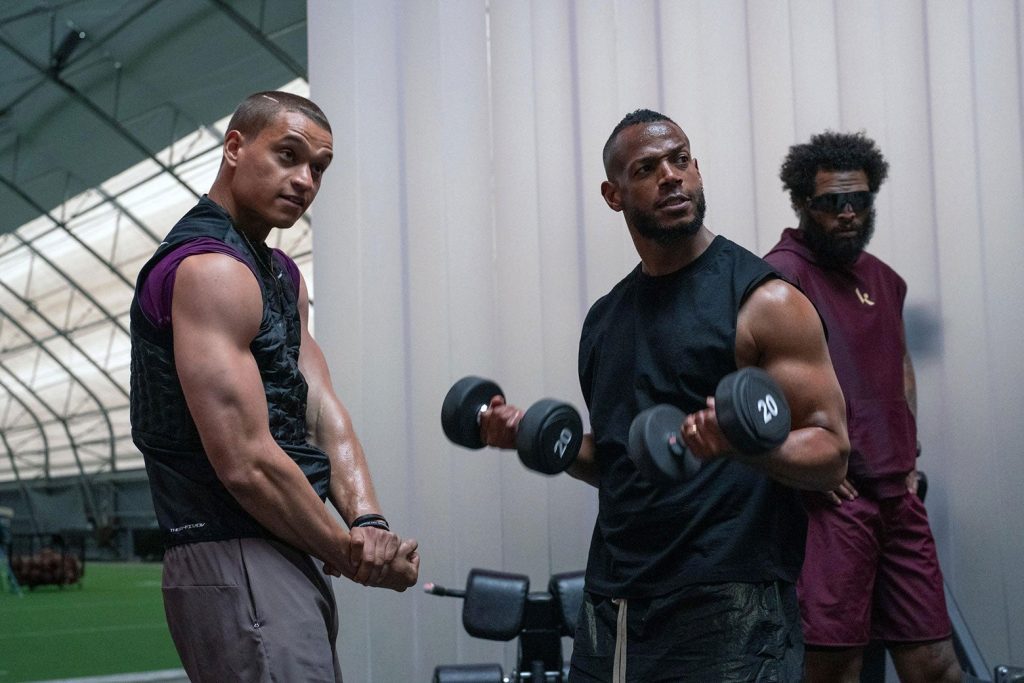Spoiler Alert for Him
Upon entering my screening of Him, the latest horror film produced by Jordan Peele and set in the football world, I came with certain apprehensions. Would the film primarily address the dangers associated with football? After all, Will Smith has tackled that topic already, and I get enough reminders each fall. Would it highlight the lack of progressive views among NFL owners regarding race? Real life illustrates that well enough too. Or would it follow in the footsteps of Playmakers, the early-2000s ESPN series that was canceled due to NFL pressure? I am already aware of football’s grim realities, so I wasn’t looking for more reinforcement on these themes.
Him is a peculiar film. I can’t label it as “good,” but credit goes to Peele and director Justin Tipping for exploring uncharted territory. The film has notable plot gaps that made me question if the creators understood football or simply assumed the audience wouldn’t notice. Yet, it captures the essence of professional football vividly. Walking out of the theater, I was amazed that NBCUniversal permitted Peele and his team to create this piece. While my press ticket and popcorn were complimentary, I wouldn’t have spent $22 to see it, but I would gladly pay more to watch it alongside NFL Commissioner Roger Goodell.
Plot Overview
The story revolves around two quarterbacks: Marlon Wayans’ character, Isaiah White, who is the top player in the fictional league resembling the NFL, and Cameron Cade, played by Tyriq Withers, a rising star. Isaiah is a megastar nearing retirement, and Cam, recovering from a mysterious brain injury, trains at Isaiah’s unconventional facility. The film opens with fans camped outside Isaiah’s home, showcasing their intense devotion. One distressed fan even confronts Cam, exclaiming that no one could ever fill Isaiah’s shoes.
The film delves into the cult-like nature of sports fandom and personal affiliations with elite athletes. While I initially questioned if the movie would shy away from criticizing the executives running the sport, any doubts were dispelled when a team owner meets a gruesome fate towards the end.
Critiques of the Film
However, numerous inconsistencies plague the film’s internal coherence. For instance, although the league mirrors the NFL’s rookie recruitment system, it oddly omits a draft process, leading to vague circumstances surrounding Cam’s placement on a leading team. Furthermore, the unexplained severity of Cam’s brain injury raises questions. His injury is serious enough to jeopardize his career but doesn’t keep him sidelined for long.
In the landscape of football-themed media, Him makes significant critiques that others do not. It takes jabs at various stakeholders, including obsessive fans and the executives profiting from them. While it falters at times, it manages to contribute original ideas to the genre.
The film excels in examining the cult-like aspects of the sport. The fictional San Antonio Saviors represent a deeply ingrained community presence. Cam witnesses Isaiah’s traumatic injury early in his career, yet Isaiah triumphs, becoming an eight-time champion. His eccentric training methods and unconventional medical advisor echo real-life inspirations, including Tom Brady. The exaggerated narrative leads to an unsettling moment where Isaiah kills a crazed fan and appears to use her remains for target practice, hinting at a dark, obsessive culture within football.
Conclusion: A Reflection on Power Dynamics
The film suggests that excelling as a quarterback requires extreme psychological traits, implying that only narcissistic individuals can shoulder the immense pressure. Throughout, Isaiah’s fixation on constant training is evident, often at the expense of real-life connections and responsibilities to others. The Saviors have odd initiation rites, including a disturbing sequence where Cam receives Isaiah’s blood through injection.
In the movie’s climax, Cam is coerced into signing a contract against his will, and as he walks away from the chaos, it’s unclear what moral lesson is ultimately conveyed. Nonetheless, especially in a time of growing media control, it’s commendable that the parent company of Sunday Night Football greenlighted such a provocative project.



